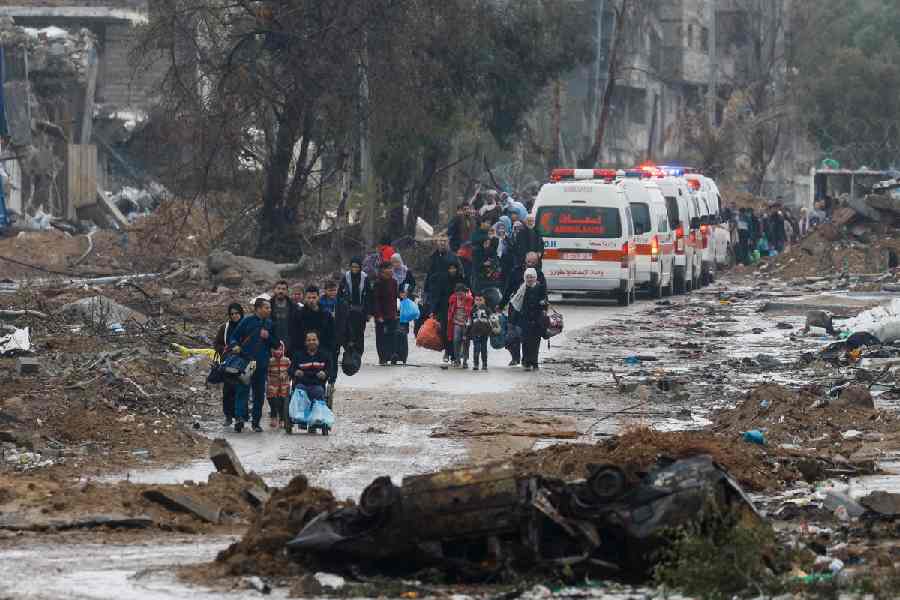A holocaust and a siege separated by 80 years of history and, yet, indelibly bound — both manifesting as State-sponsored extermination of people. The Jews endured the Holocaust under Nazi Germany; the Palestinians are suffering the siege of the Gaza Strip.
The genesis of the Israel-Hamas conflict lies in colonialism. Fuelled by imperialistic aspirations, hypocrisy and deliberate miscalculations, the state of Israel was established, legitimising what was/is the Israeli occupation of Palestinian land.
When World War I commenced, the British, keen to gain Arabian allegiance against the Ottomans, tacitly assured Palestine to the Arabs. However, the secretive Sykes-Picot agreement in 1916 between Britain and France, dividing the Ottoman lands, violated the promise.
In 1917, Arthur James Balfour, the then British foreign secretary, penned a letter to the Zionist leader, Lord Rothschild. Known as the Balfour Declaration, the letter conveyed an official British decision to sympathise with the cause of establishing a Jewish homeland in Palestine. The Declaration ensued the ‘Othering’ of the Arab community while seeking to ensure the protection of Jewish rights. On July 22, 1922, the League of Nations announced the terms of Britain’s Mandate for Palestine.
The uncomfortable truth that the West failed to act during the Holocaust by Nazi Germany stoked a colonial redemption that manifested in the creation of a Jewish national home. As the Cold War loomed, the mitigation of Western values through Israel in an anti-imperial and pro-Soviet Arabia became a necessity too.
After the British relinquished the Palestinian territory in 1947, the United Nations Special Committee on Palestine — bereft of Arab, Zionist or Great Power representation — was entrusted to determine its fate. It recommended Palestine be partitioned into two independent states — Jewish and Arab. The Zionists lobbied successfully with Washington to coerce other governments into accepting the plan. Despite Arab rejection, two-thirds of the UN General Assembly voted for partition. Jews were granted 55% and the Arabs 42% of the Palestinian territory.
The initial Palestinian resistance against Zionism was successful. But by 1948, the Zionist retaliation had gathered force. During the civil war, the British claimed neutrality and, then, abandoned the Palestinian Mandate prematurely in May 1948, creating a power vacuum. The State of Israel was established even before the British withdrawal was complete. This overnight expulsion and destruction of Palestinian society, known as al-Nakba, rendered over seven lakh Palestinians — rightful residents — as refugees.
Subsequently, the first Arab-Israeli war broke out. Responding to a British motion, the UN Security Council brokered a four-week ceasefire. The British and the United States of America, meanwhile, issued arms embargoes on the Arab countries. The ceasefire allowed Israel an opportunity to rearm. The war, which eventually claimed around 6,000 Israelis and 16,000 Palestinians, resumed in July 1948. The Arabs lost significant territories with Israel taking over 78% of Mandated Palestine. In 1950, Israel unleashed a strategy of colonial occupancy through the Law of Return — calling for the return of Jews living abroad; later, it even extended the legal ambit to those with faint Jewish connections.
With innocent lives being lost in Israel and Palestine, we must not forget where it all began and remain vigilant of the imperial white-washing of history. It continues even now: the media justification of the disproportionate Israeli retaliation as ‘revenge’ against the Hamas attack being an example. Condemning the Hamas attack on Israel is necessary. But let us not forget that Hamas was bolstered by the imperial agenda to weaken the Palestine Liberation Organization.
What would the history of Israel-Palestine have looked like sans imperialistic greed?
Debangana Chatterjee is Assistant Professor (Social Sciences), National Law School of India University, Bengaluru











